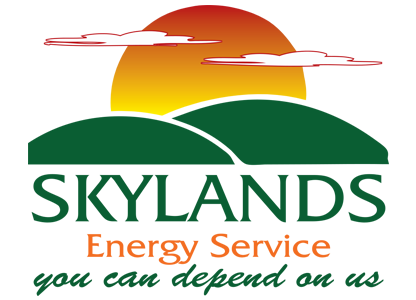
For many homeowners, a properly working boiler is the central component of their home’s heating system, ensuring a warm and welcoming environment during the chillier months. Yet, one issue frequently stands in the way of this comfort: water leaking from boiler.
When a boiler begins to leak, it can decrease efficiency and, more importantly, pose safety and maintenance risks. Within this article, Skylands Energy Service aims to explore the multiple reasons behind boiler leaks, offering a comprehensive understanding and guiding you through the measures required to handle and avert such incidents.
5 Reasons Your Boiler Is Leaking
Table of Contents
- 1 5 Reasons Your Boiler Is Leaking
- 1.1 Understanding Boiler Pressure Valve Issues
- 1.2 Issues with Corroded or Impaired Boiler Pipes
- 1.3 Issues of Boiler Seals and Gaskets
- 1.4 Boiler Expansion Tank Concerns
- 1.5 Corrosion in the Boiler Heat Exchanger
- 1.6 Spotting Signs of a Water Leaking from Boiler
- 1.7 Steps to Ward Off Boiler Leaks
- 1.8 The Value of Expert Boiler Inspection and Upkeep
- 1.9 DIY vs. Professional Boiler Repairs: Making the Right Choice
- 1.10 In Summary
- 2 Call Skylands Energy Service For All Your HVAC Needs
Understanding Boiler Pressure Valve Issues
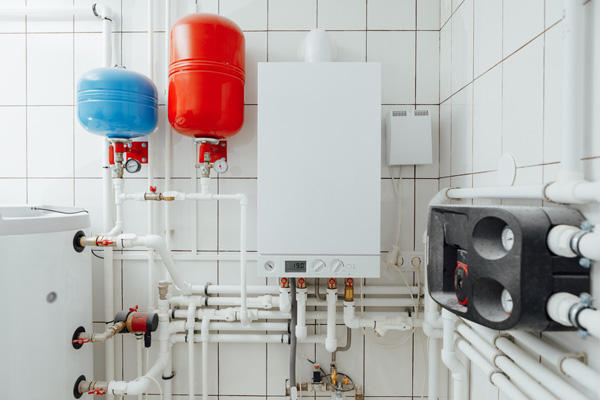
The pressure relief valve is at the core of a boiler’s safety system. Its primary function is to monitor and discharge any surplus pressure, ensuring that the boiler doesn’t exceed its safe pressure boundaries. Think of it as a safeguard that releases excess water or steam whenever the boiler’s internal pressure exceeds what’s considered safe.
Leaks stemming from the pressure relief valve are often a result of various underlying issues. One prevalent reason for water leaking from boiler is an undue accumulation of pressure. This typically arises when there’s a glitch in the expansion tank, which should ideally accommodate the water’s expansion as it heats up. If it fails, it increases system pressure, compelling the pressure relief valve to discharge water or steam. Other contributing factors to such leaks could be sediment accumulation, a faulty valve, or even incorrect installation.
Skylands Energy Service emphasizes the importance of not overlooking issues with the pressure relief valve. Neglecting them is a recipe for disaster. A faulty valve could unpredictably release high-pressure steam or water, potentially harming both the boiler and its surrounding elements. The aftermath could range from burn injuries and damage to property to, in extreme cases, boiler explosions. Hence, consistent checks, routine maintenance, and timely intervention for pressure relief valve complications are paramount to maintaining safety and the boiler’s optimal performance.
Issues with Corroded or Impaired Boiler Pipes
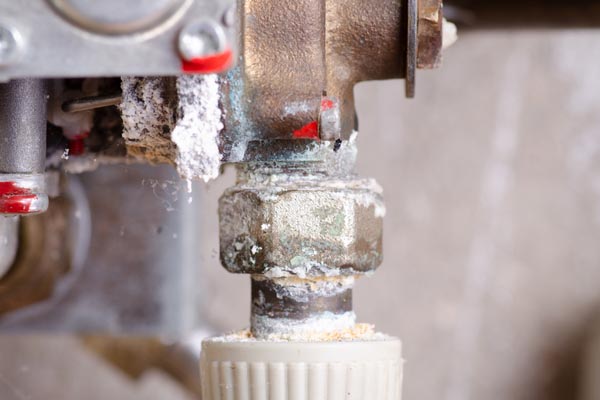
The pipes are central to the functionality of any boiler system, which play a pivotal role in channeling water and steam throughout your home. These pipes seamlessly transport the heated water or steam from the boiler, delivering warmth to different areas, be it through radiators or baseboard heaters.
Various factors can lead to pipe corrosion, compromising the system’s efficiency. Some of these factors include the longevity of the pipes, the nature of water flowing within, and chemical interactions inside the system. Over extended periods, the consistent exposure of pipes to elevated temperatures and pressures can cause them to wear out, eventually resulting in rust or scale formation. When the water quality isn’t optimal—having an excessive mineral content or being overly acidic—the corrosion rate can amplify. Additionally, specific chemical reactions between the water additives and the material of the pipes can further intensify the corrosion process.
Letting corroded pipes go unchecked has several repercussions. Firstly, they are prone to leaks, causing not only a wastage of water but also hampering the boiler’s efficiency. The deteriorated pipes lose their robustness, making them susceptible to breakdowns. Any water leaking from boiler can damage neighboring components and possibly lead to property damage. Moreover, as corrosion accumulates, the internal diameter of the pipes diminishes. This hampers the smooth flow of water or steam, leading to uneven heat distribution throughout your residence. Thus, understanding and addressing pipe corrosion is crucial for maintaining an efficient and safe heating system.
Issues of Boiler Seals and Gaskets
Integral to the boiler’s functionality, seals and gaskets act as essential buffers, ensuring that various boiler parts remain securely sealed. Their primary role is maintaining a robust barrier, stopping water and steam from leaking, and ensuring these elements remain within their designated zones.
The longevity and efficiency of seals and gaskets can be compromised due to a myriad of reasons. Typical wear and tear is a common factor. Still, other aspects like prolonged exposure to elevated temperatures or contact with chemicals and minerals in the water can also degrade their condition. Over time, such factors can lead to:
- Breakdown of material
- A reduction in their flexibility
- Development of a brittle texture
- An increased vulnerability to malfunctions
- Accumulation of unwanted deposits
- Accelerated degradation, potentially hastening their failure
When these vital components falter, the consequences are manifold. Not only can water or steam stray from their designated routes but there’s also potential for a drop in the system’s pressure. This adds strain to the boiler to sustain the required temperature and pressure levels. Consequently, energy consumption increases, leading to a dip in overall efficiency. Furthermore, compromised seals and gaskets might pave the way for external contaminants, potentially diminishing the system’s performance further. Recognizing and promptly addressing these issues is paramount for the seamless operation of your boiler.
Boiler Expansion Tank Concerns
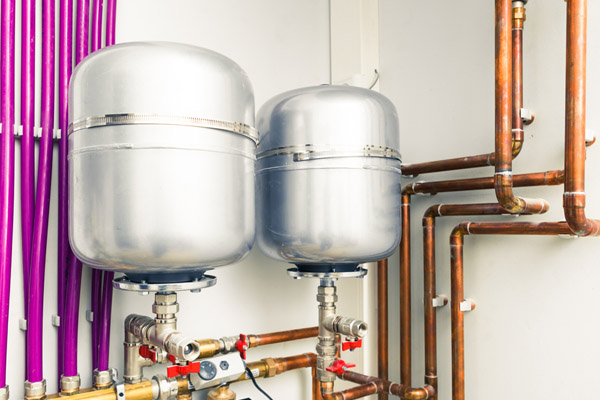
The expansion tank, which adeptly handles pressure variations, is central to the stability of a boiler system. This tank is meticulously engineered to account for water’s natural swelling and receding as it goes through its heating and cooling cycles. However, challenges may arise when there’s a malfunction, be it from a ruptured bladder or diaphragm, issues stemming from malfunctioning air valves, or simply lapses in regular upkeep.
A glaring symptom of a compromised expansion tank is water-clogging. Such a situation could lead to:
- An unhealthy rise in pressure
- Unwanted water leakages
Furthermore, if the air pressure settings aren’t calibrated correctly, it may impede the boiler’s ability to regulate pressure during its operational cycle. Not only does this threaten safety, but it also undermines the efficiency and performance of the boiler system.
Corrosion in the Boiler Heat Exchanger
Situated at the core of your boiler system is the heat exchanger. This essential component deftly facilitates heat transfer from the combustion chamber directly to the water, dispersing warmth throughout your heating infrastructure. However, the longevity and functionality of the heat exchanger can be marred by corrosion. This deterioration often arises due to sub-optimal water chemistry and the progressive accumulation of minerals.
The ramifications can be quite concerning when such corrosion sets into the heat exchanger. It may instigate unwanted water leaking from boiler or even the dangerous emission of gases, notably carbon monoxide, into the heating system. These complications dent the boiler’s efficiency and, more critically, introduce potential health risks and safety challenges.
Spotting Signs of a Water Leaking from Boiler
Although subtle, a boiler leak gives off distinct indications that homeowners must stay alert to. Several tell-tale signs hint at a potential leak:
- Wet patches or dripping water close to the boiler
- Watermarks or changes in coloration on walls or ceilings near the boiler
- A discernible drop in the boiler’s system pressure
Swiftly addressing these symptoms is of utmost importance to stave off the progression of the problem. Neglecting a boiler leak can snowball into:
- Aggravated structural damage
- Diminished boiler performance
- Potential safety concerns
- Onset of mold formation
- Electrical complications
Upon first suspicion of water leaking from boiler, homeowners are strongly advised to act. One of the most prudent steps is to enlist the expertise of a seasoned technician, like those at Skylands Energy Service, to evaluate and rectify the situation thoroughly.
Steps to Ward Off Boiler Leaks
- Prioritize scheduling professional boiler check-ups annually.
- Keep a close watch on water chemistry, utilizing additives when necessary.
- Be proactive in identifying and mending any corroded or impaired pipes.
- Regularly verify the efficient operation of the pressure relief valve.
- For those in colder regions, insulating both pipes and the boiler is a must to sidestep issues stemming from freezing.
- Diligently inspect elements like seals, gaskets, and expansion tanks, being vigilant for any signs of deterioration or damage.
The Value of Expert Boiler Inspection and Upkeep
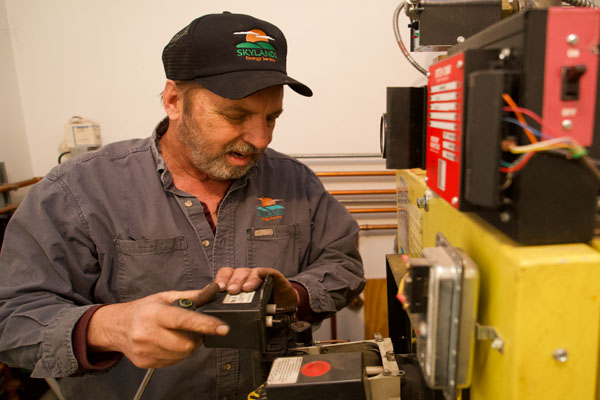
- Licensed technicians understand how to spot looming issues, such as water leaking from boiler, and preventing them from culminating in leaks.
- Professionals are adept at cleaning and fine-tuning boilers, ensuring they run at peak efficiency.
- Relying on expert evaluations assures that the system adheres to safety standards and aligns with prevailing regulations.
- Proactive Measures for Homeowners to Ensure Boiler Health and Leak Prevention
- Regularly observe and log boiler pressure and temperature to ensure they remain within recommended ranges.
- Stay attuned to any uncommon sounds or peculiar smells emanating from the system.
- At the first hint of an issue, promptly contact an HVAC specialist for a comprehensive assessment.
- Always adhere to the manufacturer’s recommendations regarding the boiler’s upkeep, functioning, and safety protocols.
Maintain a clean and airy environment around the boiler to ensure efficient operation.
Contemplate entering into a preventive maintenance agreement with a reputable service provider, like Skylands Energy Service, to inspect and service your system routinely.
DIY vs. Professional Boiler Repairs: Making the Right Choice
While the allure of DIY repairs can be tempting for many homeowners, especially with the abundant online tutorials, the boiler system is one domain where professional intervention reigns supreme. Embarking on a DIY journey with boiler leaks carries its own set of challenges and potential pitfalls:
- Lack of Expertise: The intricacies of boiler systems require specialized knowledge that the average homeowner might not possess.
- Safety Concerns: Boilers operate under high pressures and temperatures. A misstep in a DIY repair can lead to severe safety hazards.
- Potential for Aggravating Issues: Without the right expertise, one might inadvertently worsen the problem, leading to more expensive repairs down the line.
On the flip side, choosing professional HVAC technicians, like those at Skylands Energy Service, brings numerous advantages:
- Expertise & Experience: Professionals come equipped with years of hands-on experience and training, allowing them to diagnose and rectify issues accurately.
- Specialized Tools: They possess the right tools for the job, ensuring precise and efficient repairs.
- Safety & Compliance: Adherence to safety codes and regulations is guaranteed, minimizing risks and ensuring the boiler operates at its best.
In essence, when it comes to boiler repairs, trusting the expertise of professional services ensures not only the longevity of your system but also the safety and peace of mind of your household.
In Summary
Throughout our discussion, we’ve underscored the various culprits behind boiler leaks, ranging from pressure valve malfunctions, deteriorated pipes, compromised seals and gaskets, to challenges with expansion tanks and heat exchangers. Recognizing and acting upon the early signs of a boiler leak is paramount, as timely intervention can stave off escalated damages and potential safety concerns. The wisest course of action is relying on professional assistance for boiler repairs and routine maintenance.
HVAC experts, such as those from Skylands Energy Service, are armed with the necessary knowledge and tools to address and remedy these challenges adeptly, ensuring your boiler functions optimally and safely. Always prioritize your home’s warmth and safety by addressing boiler concerns promptly and professionally.
Call Skylands Energy Service For All Your HVAC Needs

Skylands Energy Service is the premier heating and cooling solution provider in central NJ. Our team boasts an ensemble of seasoned and certified professionals, each specializing in HVAC diagnostics, repairs, installations, and upgrades. We are committed to offering our esteemed clientele only the best in service quality.
At Skylands Energy Service, we recognize the paramount importance of maintaining a home that’s not only comfortable but also energy-efficient. Hence, our pricing is designed to be competitive without compromising on the quality of our offerings. Our comprehensive maintenance programs aim to bolster your home’s comfort while simultaneously curbing your energy expenditures. Should you need an HVAC intervention or a full-scale replacement, rest assured our adept technicians will provide guidance tailored to your requirements and budget. We back our services with a commitment to satisfaction, ensuring peace of mind for our customers.
Booking a service slot with us is just a phone call away. We also extend the courtesy of free in-home evaluations, empowering you to make informed choices regarding your HVAC setup. Trust in Skylands Energy Service to consistently deliver heating and cooling solutions that meet and surpass your expectations!
Contact us now at (908) 707-1776 to find out more! Click the link to view our service area.
Related Articles:

